Related Research Articles
Jazz fusion is a popular music genre that developed in the late 1960s when musicians combined jazz harmony and improvisation with rock music, funk, and rhythm and blues. Electric guitars, amplifiers, and keyboards that were popular in rock and roll started to be used by jazz musicians, particularly those who had grown up listening to rock and roll.
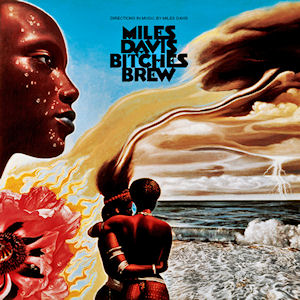
Bitches Brew is a studio album by the American jazz trumpeter, composer, and bandleader Miles Davis. It was recorded from August 19 to 21, 1969, at Columbia's Studio B in New York City and released on March 30, 1970, by Columbia Records. It marked his continuing experimentation with electric instruments that he had featured on his previous record, the critically acclaimed In a Silent Way (1969). With these instruments, such as the electric piano and guitar, Davis departed from traditional jazz rhythms in favor of loose, rock-influenced arrangements based on improvisation. The final tracks were edited and pieced together by producer Teo Macero.

John McLaughlin, also known as Mahavishnu, is an English guitarist, bandleader, and composer. A pioneer of jazz fusion, his music combines elements of jazz with rock, world music, Western classical music, flamenco, and blues. After contributing to several key British groups of the early 1960s, McLaughlin made Extrapolation, his first album as a bandleader, in 1969. He then moved to the U.S., where he played with drummer Tony Williams's group Lifetime and then with Miles Davis on his electric jazz fusion albums In a Silent Way, Bitches Brew, Jack Johnson, Live-Evil, and On the Corner. His 1970s electric band, the Mahavishnu Orchestra, performed a technically virtuosic and complex style of music that fused electric jazz and rock with Indian influences.

Jack DeJohnette is an American jazz drummer, pianist, and composer.
Charles "Don" Alias was an American jazz percussionist.

Attilio Joseph "Teo" Macero was an American jazz record producer, saxophonist, and composer. He was a producer at Columbia Records for twenty years. Macero produced Miles Davis' Bitches Brew and Dave Brubeck's Time Out, two of the best-selling and most influential jazz albums of all time. Macero was known for his innovative use of editing and tape manipulation unprecedented in jazz and proving influential on subsequent fusion, experimental rock, electronica, post-punk, no wave, and acid jazz.

The Inner Mounting Flame is the debut studio album by jazz-rock fusion band Mahavishnu Orchestra, recorded in August 1971 and released later that year by Columbia Records. After their formation, the group performed several debut gigs before they entered the studio to record their first album featuring all original material written by guitarist John McLaughlin.

In a Silent Way is a studio album by the American jazz trumpeter, composer, and bandleader Miles Davis, released on July 30, 1969, on Columbia Records. Produced by Teo Macero, the album was recorded in one session date on February 18, 1969, at CBS 30th Street Studio in New York City. Macero edited and arranged Davis's recordings from the session to produce the album. Marking the beginning of his "electric" period, In a Silent Way has been regarded by music writers as Davis's first fusion recording, following a stylistic shift toward the genre in his previous records and live performances.

Jack Johnson is a studio album and soundtrack by the American jazz trumpeter, composer, and bandleader Miles Davis. It was released on February 24, 1971, by Columbia Records.
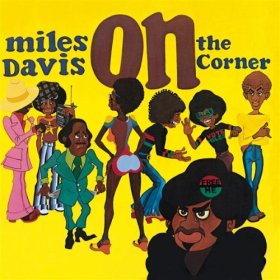
On the Corner is a studio album by the American jazz trumpeter, bandleader, and composer Miles Davis. It was recorded in June and July 1972 and released on October 11 of that year by Columbia Records. The album continued Davis' exploration of jazz fusion, and explicitly drew on the influence of funk musicians Sly Stone and James Brown, the experimental music of Karlheinz Stockhausen, the free jazz of Ornette Coleman, and the work of collaborator Paul Buckmaster.
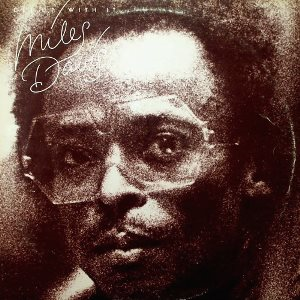
Get Up with It is an album by American jazz musician Miles Davis. Released by Columbia Records on November 22, 1974, it collected previously unreleased material that Davis had recorded between 1970 and 1974, some of which dated from the sessions for his studio albums Jack Johnson (1971) and On the Corner (1972).

Big Fun is an album by American jazz trumpeter Miles Davis. It was released by Columbia Records on April 19, 1974, and compiled recordings Davis had made in sessions between 1969 and 1972. It was advertised as a new album with "four new Miles Davis compositions" One of three Davis albums released in 1974 and largely ignored, it was reissued on August 1, 2000, by Columbia and Legacy Records with additional material, which led to a critical reevaluation.
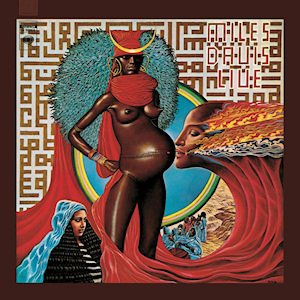
Live-Evil is an album of both live and studio recordings by the American jazz musician Miles Davis. Parts of the album featured music from Davis' concert at the Cellar Door in 1970, which producer Teo Macero subsequently edited and pieced together in the studio. They were performed as lengthy, dense jams in the jazz-rock style, while the studio recordings consisted mostly of renditions of Hermeto Pascoal compositions. The album was originally released on November 17, 1971.

The Complete Bitches Brew Sessions is a four-disc box set by jazz trumpeter Miles Davis compiling recordings between August 19, 1969, and February 6, 1970—including the 1970 double album Bitches Brew in its entirety—and released on Columbia/Legacy on November 24, 1998.
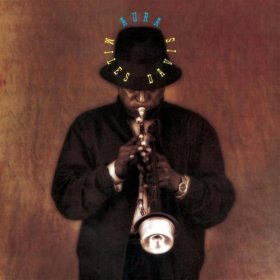
Aura is a concept album by Miles Davis, produced by Danish composer/trumpeter Palle Mikkelborg, released in 1989. All compositions and arrangements are by Mikkelborg, who created the suite in tribute when Davis received the Léonie Sonning Music Prize in December 1984, the year Decoy was released. This was Miles Davis's final album released in his lifetime.

Circle in the Round is a 1979 compilation album by jazz musician Miles Davis. It compiled outtakes from sessions across fifteen years of Davis's career that, with one exception, had been previously unreleased. All of its tracks have since been made available on album reissues and box sets.
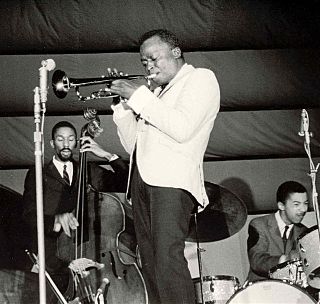
The Miles Davis Quintet was an American jazz band from 1955 to early 1969 led by Miles Davis. The quintet underwent frequent personnel changes toward its metamorphosis into a different ensemble in 1969. Most references pertain to two distinct and relatively stable bands: the First Great Quintet from 1955 to 1958, and the Second Great Quintet from late 1964 to early 1969, Davis being the only constant throughout.
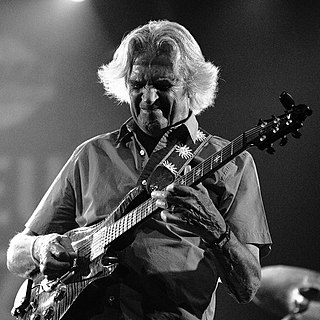
The following is a John McLaughlin discography, grouped by albums released under his name, the Miles Davis albums which he played on, albums from his group Mahavishnu Orchestra, his group Shakti, and albums where he is a session player on other artists' releases.

Electric Dreams is the fifth solo album by English jazz guitarist John McLaughlin and his "One Truth Band" released in 1979. Between his third and fourth solo albums he spent several years leading the Mahavishnu Orchestra, and Shakti.
Khalil Balakrishna is a sitar and tanpura player who worked with Miles Davis between 1969 and 1974. Guitarist John McLaughlin, already interested in Indian music, suggested him and tabla player Bihari Sharma to Davis during the Bitches Brew sessions. He toured with Davis in 1972 and early 1973.
References
- ↑ Stump, Paul (2000). Go Ahead John: The Music of John McLaughlin. SAF. p. 182. ISBN 9780946719242.
- ↑ Grella, George (2015). Miles Davis' Bitches Brew. Bloomsbury. pp. 70–71. ISBN 9781628929454.
- ↑ Gluck, Bob (2016). The Miles Davis Lost Quintet and Other Revolutionary Ensembles. U of Chicago P. p. 203. ISBN 9780226303390.
- ↑ Broughton, Simon; Ellingham, Mark (2000). World Music: Latin and North America, Caribbean, India, Asia and Pacific. Rough Guides. p. 111. ISBN 9781858286365.